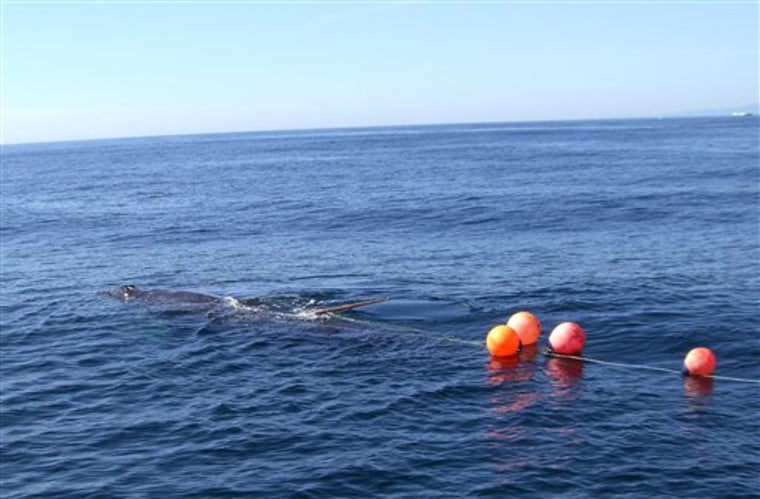Five American Indian hunters may face prosecution from their tribe after shooting and killing a gray whale in the midst of a charged legal dispute over tribal whaling.
"Their action was a blatant violation of our law and they will be prosecuted to the fullest extent of the law," the Makah tribal council said. "The tribe has demonstrated extraordinary patience in waiting for the legal process to be completed in order to receive our permit to conduct a whale hunt."
The five men, who shot a 30-foot whale on Saturday morning with harpoons and a rifle often used to hunt elephants, may also face federal charges for violations of the Marine Mammal Protection Act, the U.S. Attorney's office in Seattle said.
The Makah, a tribe of about 1,200 members, has been waiting since 1999 to resume its traditional hunt of gray whales after a federal court ruled that the tribe needs to secure a waiver from the Marine Mammal Protection Act.
That request will not be considered until an environmental impact study from the National Marine Fisheries Service is completed.
The North Pacific Gray Whale was taken off the endangered species list in 1994 and International Whaling Commission scientists said earlier this year that a small hunt should not affect the population.
No apologies
Wayne Johnson, captain of the whaling crew that in 1999 legally killed the tribe’s first whale in decades, told The Seattle Times that he and four other tribal members plunged at least five steel whaling five harpoons into the animal then shot it with a .460-caliber rifle. Initial reports said they men had fired a machine gun.
Johnson, 54, said he had no regrets — other than waiting so many years to do it.
“I’m not ashamed,” he told The Times. “I’m feeling kind of proud. ... I should have done it years ago. I come from a whaling family, on my grandmother’s side and my grandfather’s side. It’s in the blood.”
The Makah argue that it secured the right to hunt whales and seals in an 1855 treaty with the U.S. government when it reduced the size of its traditional lands.
At a recent International Whaling Commission meeting, the Makah tribe had its quota to catch up to 20 gray whales over the next five years renewed even though permission to engage in a hunt was still bogged down in the U.S. court system.
Greenpeace, which is not against indigenous whaling if the whale population can support it, said it is "unfortunate" that the law was skirted and the hunt may make it difficult for the Makah to resume hunting gray whales.
"It's going to create problems for them for sure," said John Hocevar, oceans' specialist at Greenpeace.
Men released on bail
In its statement, the council said the men were booked into the tribe’s detention facility and released after posting bail. The council said the men will stand trial in tribal court, but did not set a date.
The federal government removed the gray whale from the endangered species list in 1994. Five years later, with a permit from the National Marine Fisheries Service, Makah tribal members killed their first whale in more than 70 years.
Animal welfare activists sued, leading to a court order that the tribe must obtain a waiver under the Marine Mammal Protection Act to continue hunting whales.
John McCarty, a former tribal whaling commission member who has been an advocate of the Makah’s right to resume whaling, said the tribe had been working to obtain the waiver and that the process was close to completion.
“I don’t know why they did this. It’s terrible,” McCarty told The Times. “I think the anti-whalers will be after us in full force, and we look ridiculous. Like we can’t manage our own people, we can’t manage our own whale.”
The Times reported that four of the five men detained Saturday took part in the 1999 hunt.
All five could face civil penalties of up to $20,000 each and up to a year in jail, said Brian Gorman, a spokesman for the National Marine Fisheries Service.
The whale was headed toward the Pacific Ocean after being wounded and later disappeared beneath the surface, dragging down buoys that had been attached to a harpoon. A biologist for the tribe declared the animal dead, Coast Guard Petty Officer Shawn Eggert said.
